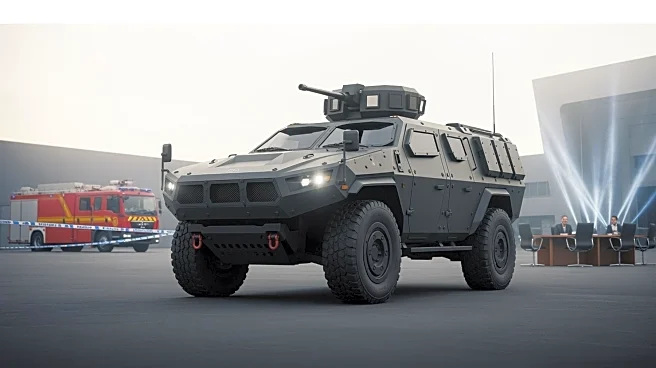What's Happening?
Germany and the Netherlands have entered into a significant defense contract valued at €3.4 billion ($4 billion) for the acquisition of Jackal wheeled infantry fighting vehicles. The deal, managed by the European
defense-acquisition body OCCAR, involves the delivery of 150 combat vehicles to the German Bundeswehr and 72 to the Dutch forces. These vehicles are based on the Boxer wheeled chassis, renowned for its modular design, and incorporate the turret and 30mm main gun of the Puma, a tracked light tank. The collaboration between Germany and the Netherlands in defense procurement is a continuation of their routine cooperation on weapons purchases and joint command operations. Rheinmetall, a co-producer of the vehicles, announced that its share of the deal amounts to nearly €3 billion. The contract is part of OCCAR's broader investment in the Boxer vehicle, which now totals €10 billion.
Why It's Important?
This deal underscores the strategic defense collaboration between Germany and the Netherlands, enhancing their military capabilities with advanced fighting vehicles. The investment in the Boxer-based vehicles reflects a commitment to modernizing defense infrastructure, which is crucial for maintaining security and operational readiness in Europe. The deal also highlights the role of OCCAR in facilitating multinational defense procurement, promoting efficiency and interoperability among member states. For the U.S., this development may influence defense partnerships and cooperative strategies within NATO, as Germany and the Netherlands are key allies. The acquisition of these vehicles could also impact the defense industry, potentially leading to further innovations and investments in military technology.
What's Next?
The delivery and integration of the Jackal vehicles into the German and Dutch armed forces will be a critical next step. This process will involve training personnel and adapting operational strategies to incorporate the new technology. Additionally, further developments are anticipated, including battlefield ambulances and bridge-laying versions based on the Boxer chassis. These advancements will likely enhance the versatility and capability of the forces involved. Stakeholders, including defense contractors and military strategists, will be closely monitoring the implementation and performance of these vehicles to assess their impact on defense operations.
Beyond the Headlines
The deal may have broader implications for European defense policy, potentially influencing future procurement strategies and collaborative efforts among EU member states. The focus on modular and adaptable military technology could drive innovation in defense systems, encouraging other nations to invest in similar capabilities. Additionally, the partnership between Germany and the Netherlands may serve as a model for other countries seeking to enhance their defense cooperation and joint command structures.










